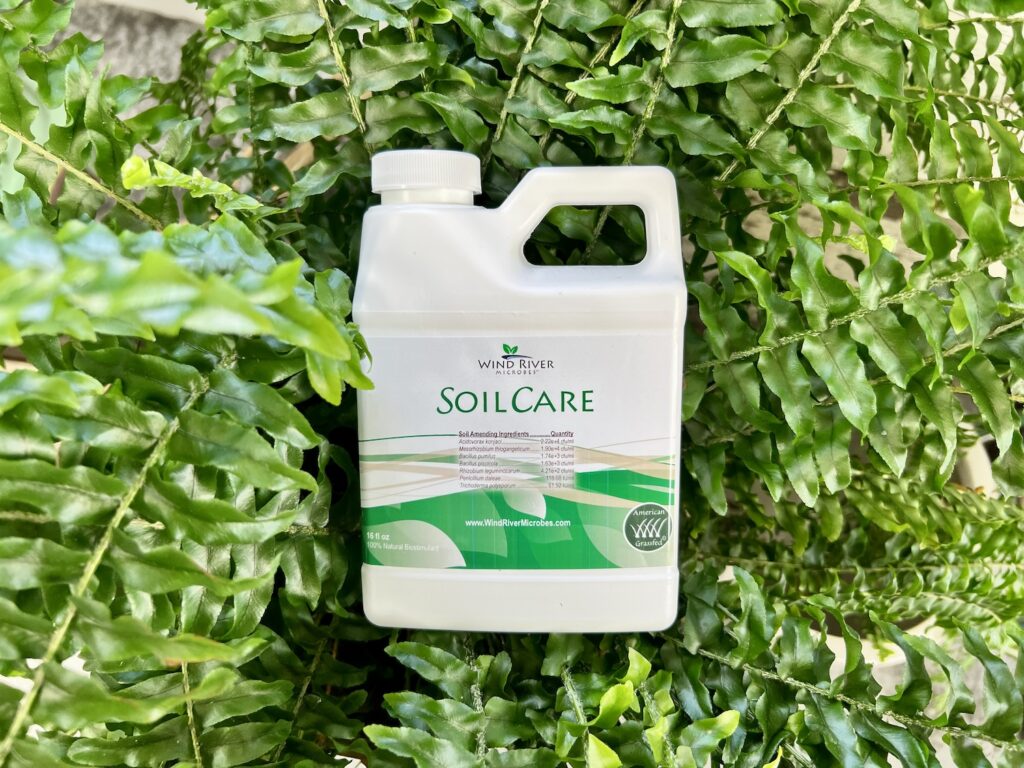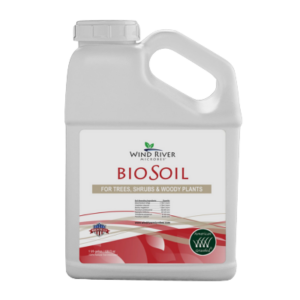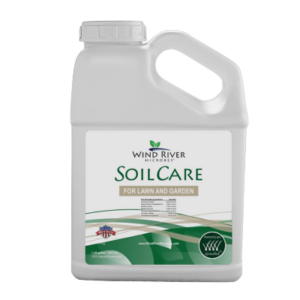Some of us humans take probiotics after a course of antibiotics, and some of us take them daily to help our gut health. It seems the more we learn about these little microbes, the more we understand that they are essential for all life, including plants!
At Grass Roots, we recommend liquid plant probiotics, like Wind River SoilCare, for lawns, shrubs, trees, and even landscape beds. And there’s one category of plants that can benefit from these probiotics more than any others…indoor plants!
People have been using “compost tea”- the water runoff from compost that contains microbes- for thousands of years. These days, labs can cultivate these natural microbes on an industrial scale, making them readily available at your local plant store.
What do probiotics do for plants?
Probiotics, which are “good” microorganisms such as bacteria and fungi, can benefit plants in a variety of ways. Here’s how:
- Enhanced nutrient uptake: Probiotics can break down organic matter in the soil and release nutrients that are otherwise unavailable to the plants. They can also convert atmospheric nitrogen into a form that plants can use, which can increase plant growth and yield.
- Improved soil structure: Probiotics can help improve soil structure by binding soil particles together, creating a more porous soil that allows water and air to move freely through it. This can help prevent soil compaction and improve root growth.
- Disease resistance: Probiotics can help plants fight off diseases by outcompeting harmful pathogens for resources and by killing off bad bacteria. This can reduce the need for chemical pesticides and fungicides.
- Stress tolerance: Probiotics can help plants tolerate less-than-perfect conditions, such as drought or high temperatures, by improving the plant’s ability to absorb and use water.
Overall, probiotics can promote healthy plant growth and reduce the need for chemical inputs, which can benefit both the plant and the environment.
Why are probiotics especially important for indoor and house plants?
First, indoor plants are usually planted in potting soil. Potting soil has been heated to kill any live organisms or seeds. This is so seedlings and plants have a fresh start in untainted soil. Once a plant gets to a certain size, however, it starts needing the good bacteria in the soil. Since there are no earthworms or other critters in your house plants to transport the bacteria, you need to take matters into your own hands. Adding a liquid probiotic to house plants mimics their native outdoor environment.
Are liquid plant probiotics toxic to humans or pets?
One feature we love about SoilCare is that it’s safe for pets and humans. In addition, you can’t overuse it like you can with fertilizers and chemicals. There’s no danger to the plant if you are overly ambitious with your dosing.
How should I apply liquid plant probiotics?
As previously mentioned, you can’t overuse it like you can with fertilizers and chemicals. There’s no danger to the plant if you over apply – in fact, you can spray it on leaves, edible parts, flowers, and on the root zone. It’s a natural product that you can use anywhere!
It’s important to follow the instructions for your specific application, but here are some general guidelines:
- Apply probiotics every 6-8 weeks.
- Remember that microbes hang out on, near, and sometimes inside the actual roots of plants, so be sure this is where most of the liquid ends up.
- Trees and shrubs- poke holes in the ground in a spiral from the trunk out to the drip line with rebar or a shovel, creating mini wells. Pour probiotics over the whole area, being sure to get in the holes. You can either pour the concentrate then soak with a hose, or pre-mix before pouring.
- If you use drip irrigation or tree watering bags, you can add it straight into the water!
- Small outdoor plants- apply around the roots
- Indoor plants- mix the probiotic concentrate with water and water your plants as normal. Alternatively, you can spray the leaves with a diluted mixture until they are dripping onto the soil. This helps prevent fungi that attack foliage.
- Try not to apply before a heavy rain where it could be washed away.
- Applying on moist soil works best, as it will soak up the liquid like a sponge.
How should I use probiotics on my lawn?
Lawns can benefit from probiotics as much as other plants. You’ll notice less damage from drought and heat, and plants will be much healthier overall.
- If you’re already spraying your lawn, go ahead and add in SoilCare to the mix, just check the ingredient list to be sure it’s compatible with other products you may be spraying. You don’t want to apply with a fungicide, as it will kill any microbes you apply.
- Using probiotics is a great alternative to fertilizer in the summer, especially during a drought.
- If you’re just applying probiotics, you can walk and play on your lawn right after application.
- Keep moist for a few days after application.
Why use probiotics in your garden?
Most gardeners want to minimize the amount of chemicals they apply to their gardens since the end goal is to eat what you grow. Applying probiotics can help! They proactively help plants stay healthy, and reduce the need for chemicals as a solution for insects or disease. Plus, plants that are able to access all available nutrients in the soil will grow bigger and taste more delicious. It’s not foolproof, but it’s a step in the right direction!
What exactly is in a liquid probiotic concentrate?
At Grass Roots in Marshfield, Missouri, we have selected SoilCare and BioSoil as our plant probiotics. It contains billions of beneficial bacteria and fungi to help your plants live their best lives.
Other tips for using liquid plant probiotics
- You can soak seeds in it before planting- this gives the seeds a head start when they germinate.
- If you have an indoor plant that’s struggling, try probiotics before adding fertilizer. It may just need a little help with nutrient uptake.
To sum it up, probiotics help plants have a healthy “immune system” and reduce the need for chemicals and fertilizers. Probiotics won’t totally prevent disease and insects, but create healthier plants that withstand damage and ward off disease. If you want your plants naturally healthy from top to bottom, probiotics may be just the addition they need!





